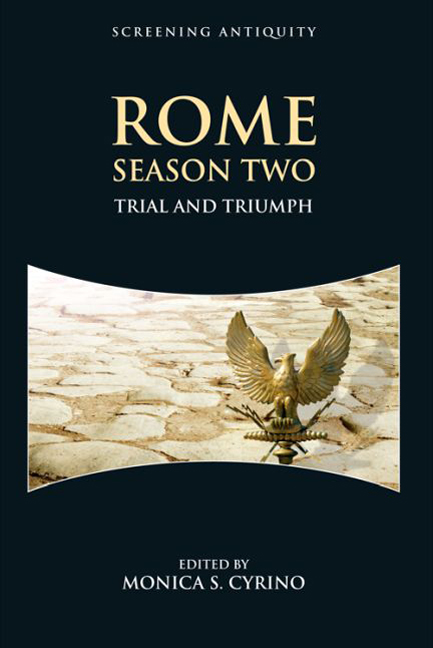Book contents
- Frontmatter
- Contents
- Series Editors’ Preface
- Editor's Acknowledgments
- Contributors
- List of Illustrations
- Episode Listing
- Cast List
- Introduction: The Trials and Triumphs of Rome, Season Two
- PART I POWER AND POLITICS
- PART II Sex and Status
- 8 Revenge and Rivalry in Rome
- 9 Effigies of Atia and Servilia: Effacing the Female Body in Rome
- 10 Livia, Sadomasochism, and the Anti-Augustan Tradition in Rome
- 11 Windows and Mirrors: Illuminating the Invisible Women of Rome
- 12 Antony and Atia: Tragic Romance in Rome
- 13 Problematic Masculinity: Antony and the Political Sphere in Rome
- 14 Rome, Shakespeare, and the Dynamics of the Cleopatra Reception
- 15 The Rattle of the Sistrum: “Othering” Cleopatra and Egypt in Rome
- 16 Gateways to Vice: Drugs and Sex in Rome
- 17 Slashing Rome: Season Two Rewritten in Online Fanfiction
- Filmography
- Bibliography
- Index
13 - Problematic Masculinity: Antony and the Political Sphere in Rome
from PART II - Sex and Status
Published online by Cambridge University Press: 07 October 2017
- Frontmatter
- Contents
- Series Editors’ Preface
- Editor's Acknowledgments
- Contributors
- List of Illustrations
- Episode Listing
- Cast List
- Introduction: The Trials and Triumphs of Rome, Season Two
- PART I POWER AND POLITICS
- PART II Sex and Status
- 8 Revenge and Rivalry in Rome
- 9 Effigies of Atia and Servilia: Effacing the Female Body in Rome
- 10 Livia, Sadomasochism, and the Anti-Augustan Tradition in Rome
- 11 Windows and Mirrors: Illuminating the Invisible Women of Rome
- 12 Antony and Atia: Tragic Romance in Rome
- 13 Problematic Masculinity: Antony and the Political Sphere in Rome
- 14 Rome, Shakespeare, and the Dynamics of the Cleopatra Reception
- 15 The Rattle of the Sistrum: “Othering” Cleopatra and Egypt in Rome
- 16 Gateways to Vice: Drugs and Sex in Rome
- 17 Slashing Rome: Season Two Rewritten in Online Fanfiction
- Filmography
- Bibliography
- Index
Summary
“Running this damn city isn't nearly as amusing as I thought it would be,” complains Antony as he reclines in a candlelit bath with his patrician lover Atia in episode 14 of Rome. His petulance is due to the fact that he is under mounting pressure from commercial and political leaders to deal with the chaos on the Aventine, Cleopatra is not the sexual pushover he had envisaged, and Cicero is uncomfortably cognizant of his own power relative to Antony's. Having seized control of Rome in the aftermath of Caesar's death, Antony expected that the strong-arm tactics that had served him so well as the dictator's quasi-political muscle would continue to reap the kind of financial – and authoritative – rewards to which he has been accustomed as the right-hand man to a political force majeur. That true power, power in its own right, has proven capricious is revealing of Antony's gender position within the text. This chapter will argue that the relationship of Rome's Mark Antony to the public sphere – how he uses it and performs within it – is key to situating him on a continuum of problematic masculine performance that has ghosted Antony's position in popular culture for as long as popular culture has revisited his mythology. I will also argue that his incarnation in Rome is unique in terms of the way it chooses to structure his relationship to the political, and attempt to place this in the context of a wider socio-cultural debate about masculinity.
ANTONY AND MASCULINITY
Rome's Antony is a strange beast, and he defies simplistic evaluation. On the one hand, he can be situated alongside his previous incarnations on screen – Henry Wilcoxson (1934), Raymond Burr (1953), Richard Burton (1963), and Billy Zane (1999) – in that he evidences an engagement with wider socio-cultural anxieties around masculinity and a hegemonic masculine ideal. On the other, he deviates significantly from his predecessors in a number of key areas that, while the overarching message remains the same, demand closer engagement with his means of performing sub-hegemonic masculinity.
Hegemony itself is capricious; gender hegemony particularly so. Its nature is to be invisible, coded into the structures of societal discourse in a manner that allows it to be reproduced as something “everyone knows.”
- Type
- Chapter
- Information
- Rome Season TwoTrial and Triumph, pp. 169 - 181Publisher: Edinburgh University PressPrint publication year: 2015



